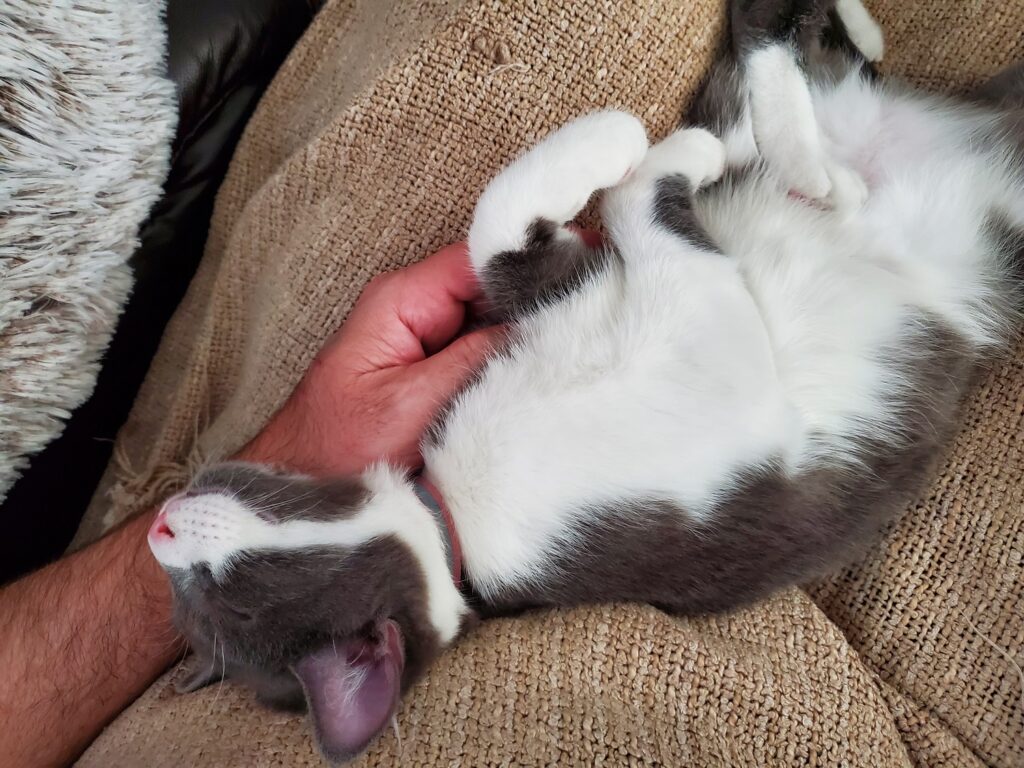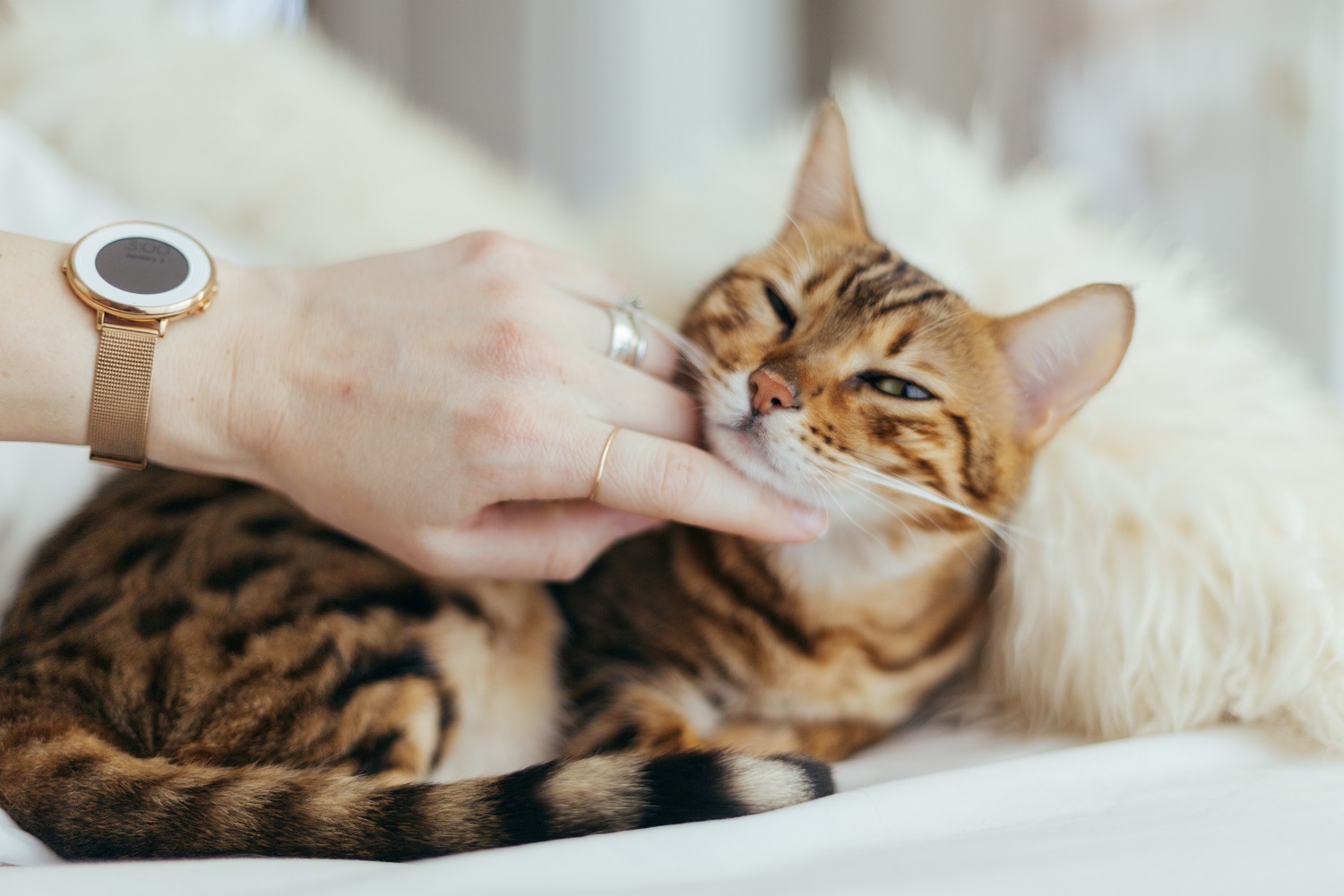Your kitten curls up in your lap, turns on that tiny built-in motor, and starts purring like it is their full-time job. Then they purr while playing. And while eating. And again while sitting alone in a sunbeam. It might leave you wondering what is going on.
The good news is, this is totally normal. Kittens purr a lot because it is their default communication tool, and it serves more than one purpose. While purring is often associated with happiness and comfort, it can also signal other things like stress, pain, or a simple need for attention.
Let’s break down the real reasons behind all that rumbling, what it tells you about your kitten’s mood, and when you should be concerned.
Purring Starts Early and Serves a Purpose
Kittens start purring when they are just a few days old. It is one of the first ways they communicate with their mother. While nursing, they purr to signal that they are okay, that they are bonding, and that everything is going smoothly in their tiny kitten world.
This behavior continues as they grow. It becomes a go-to form of communication not just with their mom, but with humans and other animals as well. For kittens, purring is a multi-use tool, kind of like their version of a smile, a sigh, and a little internal self-care mechanism all rolled into one.
Why Your Kitten Purrs So Much
Purring is not just about being happy, though it often is. There are several reasons your kitten might be purring constantly, and many of them are perfectly healthy.
1. Comfort and contentment
This is the classic reason. If your kitten is snuggled up, getting pets, or dozing off in a warm blanket, the purring you hear is likely a sign that they feel safe, cozy, and happy to be exactly where they are.
2. Seeking attention
Purring can be used to get your attention, especially if it comes with a little headbutt or a paw tap. Your kitten may be asking for cuddles, food, or playtime.
3. Self-soothing
Kittens may purr to calm themselves down. This happens when they are unsure, anxious, or even recovering from something scary like a vet visit. The vibration of purring actually has a calming effect on their nervous system.
4. Healing and pain relief
Purring is linked to the release of endorphins. It is believed to help reduce pain and even promote healing in bones and tissues. If your kitten is purring while resting or after an injury, it may be helping them recover.
5. Habit and instinct
Some kittens just purr more than others. If your kitten was well-socialized early and spent a lot of time bonding with their mom or humans, they may have learned to purr as their go-to communication method. It is not always meaningful. It is just what they do.
What the Science Says About Purring
The exact mechanism of purring is still being studied, but researchers know it involves the laryngeal muscles twitching rapidly during both inhalation and exhalation. This creates that low, rhythmic rumble we all know and love.
More interesting is the fact that the frequency of a cat’s purr falls between 25 and 150 Hz, which is a range associated with therapeutic healing in humans and animals. These vibrations are thought to:
- Improve bone density
- Promote wound healing
- Reduce inflammation
- Lower stress hormones
In other words, purring is not just cute. It is literally beneficial to your cat’s body, and maybe even to yours, if you are lucky enough to be on the receiving end.
When Purring Might Signal a Problem
Not all purring is happy purring. Cats will sometimes purr when they are in pain, distress, or feeling unwell. This can be confusing because it seems like a sign of calm, but it can also be a self-soothing behavior in uncomfortable situations.
Watch for signs like:
- Purring paired with hiding, low energy, or loss of appetite
- Purring while breathing heavily or appearing restless
- Purring alongside limping or sensitivity to touch
- Purring during a sudden change in behavior or litter box habits
If your kitten’s purring seems unusual or excessive and comes with other red flags, it is time to check in with your vet. Better safe than sorry, especially when your kitten cannot explain how they are feeling.

Oh, yeah… That’s the spot. Don’t forget to scratch behind my ears! #KittenLove #SirPurrsALot #CuddlesAreForBabiesButI’llTakeThemAnyway
Joey
How to Respond to a Purring Kitten
In most cases, a purring kitten just wants what every kitten wants: affection, attention, and maybe some snacks. If your kitten is purring, they may be:
- Feeling content in your arms
- Asking you not to stop petting them
- Letting you know they feel safe
- Signaling that something feels off and they need comfort
Tuning in to context and body language helps you decode what your kitten is really saying. Are they relaxed? Tail gently swishing? Eyes half closed? That is a happy purr. Are they stiff, crouched, or acting unusually quiet? That purr may need a closer look.
Final Thoughts: Purring Means More Than You Think
When your kitten purrs all the time, it usually means they are happy, healthy, and adjusting well to their world. Purring is their first language, and they use it for just about everything; comfort, connection, and yes, the occasional request for a treat.
Still, it is worth paying attention. Not every purr means joy, and over time, you will learn the difference between “I love this nap” and “I need a little help.” Trust your gut and your kitten’s cues, and you will be speaking fluent purr in no time.
Sources:
Why Do Cats Purr? https://www.petmd.com/cat/behavior/why-do-cats-purr
Understanding Cat Behavior https://www.humanesociety.org/resources/understanding-your-cats-behavior
Healing Properties of Cat Purring https://www.icatcare.org/advice/why-do-cats-purr
Purring as Communication https://vcahospitals.com/know-your-pet/cat-behavior-communication
Recent Posts
Your Cat Might Be a Furry Little Healer… or at Least a Fuzzy Alarm System If you’ve ever had your cat suddenly become extra clingy when you’re under the weather, you’re not alone. From...
Cats are experts at hiding things, socks under furniture, their disdain for your playlist, and, unfortunately, symptoms of illness. In the wild, showing weakness could make them a target, so even...


